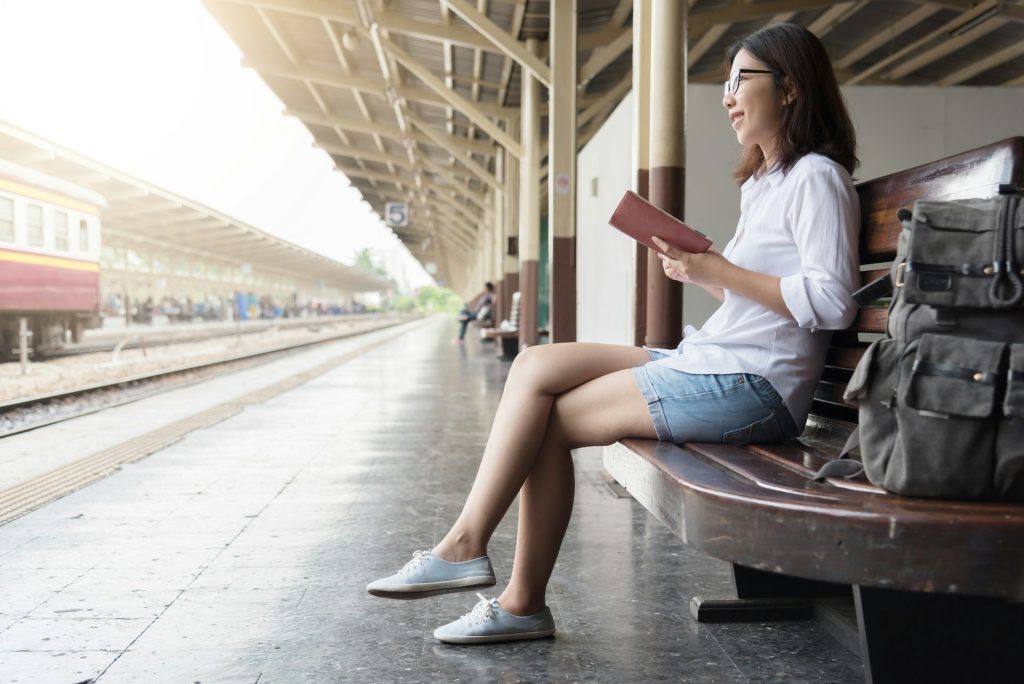Table of Contents
I stood in the crowded streets of Pamplona, heart racing, as I watched the bulls thunder past. The scene was exactly as Hemingway had described it in “The Sun Also Rises,” yet experiencing it firsthand was electrifying. In that moment, I realized that literature had the power to not just inspire travel, but to completely transform it.
Books as Travel Companions
There’s something magical about reading a book set in the place you’re visiting. It’s like having a secret window into the soul of a destination, revealing layers of meaning and history that might otherwise go unnoticed.
I remember wandering through the winding alleys of Venice with Donna Leon’s Commissario Brunetti mysteries in my backpack. Suddenly, every canal and campo held potential clues, and I found myself looking at the city through the eyes of her detective protagonist.
The crumbling palazzos and shadowy sotoportego took on new significance, and I felt like I was uncovering the hidden Venice that tourists rarely see.

Literary Pilgrimages
Some of my most memorable trips have been inspired by beloved books. These literary pilgrimages have taken me to places I might never have considered otherwise, and they’ve added a rich layer of meaning to my travels.
One summer, I decided to follow in the footsteps of Jack Kerouac’s “On the Road.” I drove across America, from New York to San Francisco, stopping at many of the places Kerouac described.
Sitting in the same Denver bars where Dean and Sal had their wild adventures, or gazing out at the Pacific from Big Sur, I felt a profound connection not just to the book, but to a whole era of American history and culture.
Deepening Cultural Understanding
Reading literature from or about a place you’re visiting can dramatically deepen your understanding of its culture, history, and people. It provides context and nuance that guidebooks often miss.
Before my trip to Japan, I immersed myself in the works of Haruki Murakami. His surreal, dreamlike stories gave me insights into the Japanese psyche that went far beyond the surface-level observations of a typical tourist.
When I found myself in a tiny jazz bar in Tokyo, sipping whisky and listening to old records, I felt like I had stepped into one of Murakami’s novels. The experience was richer and more meaningful because of the literary context I had absorbed.
Discovering Hidden Gems
Authors often have an intimate knowledge of the places they write about, and their books can lead you to hidden gems that you might otherwise miss.
I discovered this while exploring Edinburgh with Ian Rankin’s Inspector Rebus novels as my guide. Rankin’s detailed descriptions led me to atmospheric old pubs, tucked-away closes, and viewpoints that offered unique perspectives on the city.
I felt like I was uncovering the real Edinburgh, beyond the tourist trails, seeing it through the eyes of both the author and his gruff detective.
The Power of Local Literature
Reading works by local authors can provide invaluable insights into the contemporary culture and issues of a place. It’s like having a local friend giving you the inside scoop.
During a trip to Nigeria, I delved into the works of Chimamanda Ngozi Adichie. Her novels and essays opened my eyes to the complexities of modern Nigerian society in a way that no guidebook could.
When I visited Lagos, I felt like I had a deeper understanding of the city’s dynamic energy and the challenges its residents face. It made my interactions with locals more meaningful and nuanced.
Books as Emotional Preparation
Travel can be overwhelming, especially when visiting places with difficult histories or challenging social issues. Literature can help prepare you emotionally for these experiences.
Before visiting Cambodia, I read “First They Killed My Father” by Loung Ung. The book’s harrowing account of the Khmer Rouge regime gave me a profound understanding of the country’s recent history.
When I visited the Killing Fields and Tuol Sleng Prison, I was able to engage with these sites more deeply and respectfully because of the emotional groundwork the book had laid.

The Joy of Literary Serendipity
Some of my favorite travel moments have come from unexpected literary connections. There’s a special thrill in stumbling upon a place you’ve read about or discovering a local author while on the road.
I’ll never forget the day I wandered into a small bookshop in Buenos Aires and discovered Jorge Luis Borges.
I spent the rest of my trip exploring the city with his fantastical stories swirling in my mind, seeing the familiar streets transformed by his imagination. It added an entirely unexpected dimension to my experience of Argentina.
Creating Your Own Literary Map
One of the most enjoyable aspects of being a literary traveler is creating your own personal map of book-related locations. It’s like a secret layer of meaning that you carry with you wherever you go.
I’ve stood on the very spot in Dublin where Leopold Bloom bought his lemon soap in Joyce’s “Ulysses.” I’ve had tea at the Elephanta Hotel in Colombo, just like the characters in Michael Ondaatje’s “The Cat’s Table.”
Each of these experiences feels like adding a pin to a personal map of literary adventures, creating a rich tapestry of connections between books and places.
Books as Travel Inspiration
Sometimes, a book can inspire you to visit a place you’ve never even considered before. The power of literature to spark wanderlust is truly remarkable.
I never had any interest in visiting Iceland until I read “Independent People” by Halldór Laxness.
The book’s vivid descriptions of the harsh, beautiful landscape and the resilient spirit of its people completely captivated me. I found myself booking a ticket to Reykjavik, eager to experience this land of sagas and stark beauty for myself.
The Aftermath: How Travel Changes Your Reading
One of the unexpected joys of literary travel is how it changes your reading experiences long after you’ve returned home. Books set in places you’ve visited take on new life, filled with vivid memories and personal connections.
After walking the streets of Calcutta, Jhumpa Lahiri’s stories about the city became so much more than words on a page. I could smell the spices, hear the chaos of the streets, feel the oppressive heat. My travels have transformed my reading, making it a richer, more immersive experience.
Sharing the Literary Journey
There’s something special about connecting with other travelers over shared literary experiences. Books can become a common language, bridging cultural divides and sparking fascinating conversations.
In a hostel in Lisbon, I bonded with a group of travelers over our shared love of Fernando Pessoa. We spent an evening wandering the city, visiting his favorite cafes and discussing his various heteronyms.
It was a connection that went beyond typical traveler small talk, delving into philosophy, identity, and the nature of reality – all inspired by our shared literary interest.
The Challenge of Translation
Reading literature in translation while traveling can offer fascinating insights into the challenges of conveying meaning across languages and cultures.
While traveling through Russia, I read both the English translation and the original Russian version of Pushkin’s “Eugene Onegin” (with the help of a very patient local friend).
The experience opened my eyes to the nuances lost and gained in translation, and gave me a deeper appreciation for the complexity of the Russian language and culture.
The Lifelong Journey of the Literary Traveler
Let literature be your guide, your companion, and your key to unlocking the deeper mysteries of the places you visit. The world is waiting, and its stories are ready to be discovered.

I’m Simon St John, an editor who thrives on finding the profound moments in travel. With a background in crafting engaging stories for all generations, I delve into both grand adventures and simple discoveries. Through Tripnosis.me, I aim to showcase how travel can be a powerful catalyst for personal growth and deeper connections. My goal is to present fresh narratives that inspire and redefine your travel experience.




